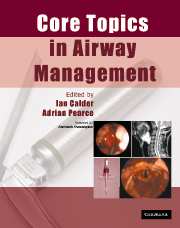Book contents
- Frontmatter
- Contents
- List of contributors
- Preface
- Acknowledgements
- List of abbreviations
- 1 Anatomy
- 2 Physiology of apnoea and hypoxia
- 3 Physics and physiology
- 4 Cleaning and disinfection of airway equipment
- 5 General principles
- 6 Maintenance of the airway during anaesthesia: supra-glottic devices
- 7 Tracheal tubes
- 8 Tracheal intubation of the adult patient
- 9 Confirmation of tracheal intubation
- 10 Extubation
- 11 Light-guided intubation: the trachlight
- 12 Fibreoptic intubation
- 13 Retrograde intubation
- 14 Endobronchial and double-lumen tubes, bronchial blockers
- 15 ‘Difficult airways’: causation and prediction
- 16 The paediatric airway
- 17 Obstructive sleep apnoea and anaesthesia
- 18 The airway in cervical trauma
- 19 The airway in cervical spine disease and surgery
- 20 The aspiration problem
- 21 The lost airway
- 22 Trauma to the airway
- 23 Airway mortality associated with anaesthesia and medico-legal aspects
- 24 ENT and maxillofacial surgery
- 25 Airway management in the ICU
- 26 The airway in obstetrics
- Index
10 - Extubation
Published online by Cambridge University Press: 15 December 2009
- Frontmatter
- Contents
- List of contributors
- Preface
- Acknowledgements
- List of abbreviations
- 1 Anatomy
- 2 Physiology of apnoea and hypoxia
- 3 Physics and physiology
- 4 Cleaning and disinfection of airway equipment
- 5 General principles
- 6 Maintenance of the airway during anaesthesia: supra-glottic devices
- 7 Tracheal tubes
- 8 Tracheal intubation of the adult patient
- 9 Confirmation of tracheal intubation
- 10 Extubation
- 11 Light-guided intubation: the trachlight
- 12 Fibreoptic intubation
- 13 Retrograde intubation
- 14 Endobronchial and double-lumen tubes, bronchial blockers
- 15 ‘Difficult airways’: causation and prediction
- 16 The paediatric airway
- 17 Obstructive sleep apnoea and anaesthesia
- 18 The airway in cervical trauma
- 19 The airway in cervical spine disease and surgery
- 20 The aspiration problem
- 21 The lost airway
- 22 Trauma to the airway
- 23 Airway mortality associated with anaesthesia and medico-legal aspects
- 24 ENT and maxillofacial surgery
- 25 Airway management in the ICU
- 26 The airway in obstetrics
- Index
Summary
Introduction
There is a fundamental problem attached to extubation. If the tube is removed when airway reflexes are recovered then the presence of the tube will make the patient uncomfortable and sympathetically stimulated. If the tube is removed before the reflexes have returned, then the patient is at risk of aspiration and loss of airway. The former situation may be safer but aesthetically displeasing, while the latter may be nicer to watch but less safe.
Few (if any) experienced anaesthetists approach extubation with total confidence that their patient will suffer no adverse event and their own dignity will be unruffled. It is also true that nowadays we get much less practice in extubation because the laryngeal mask has drastically reduced the need for intubation.
There have never been, and there are unlikely to be, any randomized controlled trials of extubation methods. Extubation remains the ‘Cinderella’ of management of the difficult airway. In the UK the Difficult Airway Society Guidelines do not include advice on the management of extubation, although similar guidelines from Canada and the USA include some advice. Articles on the management of extubation are few and far between, and by nature are full of opinion and very little in the way of evidencebased medicine. Basic questions, such as does coughing at extubation have any influence on postoperative complications like haematoma formation after neuro-, ENT (ear, nose and throat), plastic or eye surgery are unanswered.
However, anaesthesia providers are increasingly recognizing the importance of the emergence, extubation and recovery period as an important contributor to anaesthetic morbidity, and focusing efforts at improving delivery of a quality service in this area.
- Type
- Chapter
- Information
- Core Topics in Airway Management , pp. 87 - 92Publisher: Cambridge University PressPrint publication year: 2005
- 3
- Cited by



